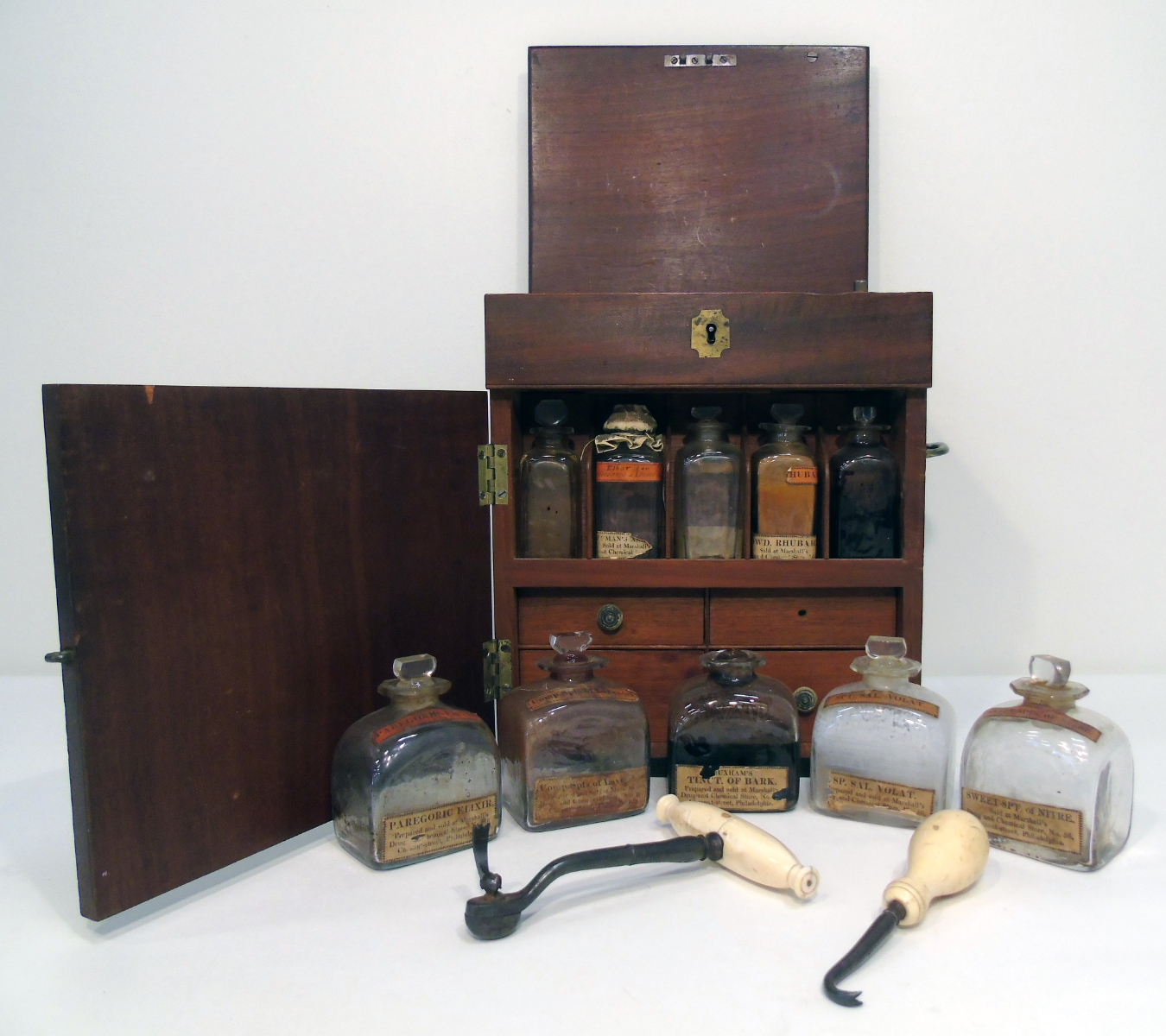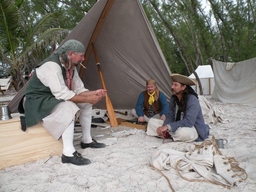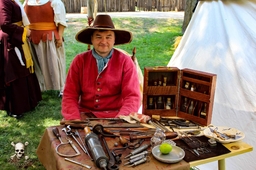-
Posts
5,186 -
Joined
-
Last visited
Content Type
Profiles
Forums
Events
Gallery
Everything posted by Mission
-
They are, in fact, considered undergarments. And I agree with everyone that those are best made of linen. It's quite comfortable and parts of the shirt are visible in both men's and women's period attire.
-
Or never. (Period men's undergarments are absurd.)
-
I dunno... as European descendants, wouldn't our role be slaves in this scenario?
-
Like this. (It is not as complex as it looks in this drawing for someone who is used to working with wood. Plus, being rustic, it doesn't have to be exact.) The nice thing about this is the dowels keep the legs in place and groove in the bottom of the seat keeps the dowels from poking too far through.
-
I would have made this style with the legs like an upside down U with two small (say 1" or so) dowels in the top of the U to fit into the bottom of the seat. Then you could cut the dowels level with the top of the seat once they were in place. You could router the 15 degree groove in the bottom of the seat because no one would see it.
-
Rice turned out to be the surprise grain for me. A lot of the counts come from the East Indies (the first part of the GAoP primarily occurred there, after all). However, there is a variety of rice, oryza glaberrima, which originated in Africa and was carried from there across the Atlantic thanks to the slave trade. There is also a really interesting story about how rice became a huge crop in the Carolinas during the GAoP which involves a privateer surgeon and (allegedly, although this is probably not true) the captain of a ship trading with pirates in Madagascar. While I hope people read all of the article (a lot of info, not to mention blood, sweat and tears went into it), the section on rice is particularly fascinating. Corn is similarly important because of the records of the West Indies. (Corn was a giant PITA to research because I was trying to find information about sweet corn as I mentioned in the vegetable article. I basically found no evidence of it, so I had to assume when it wasn't specified, sailors were talking about dent or field corn.) As for barley, it was mostly looked down upon as food for the poor. The English market as well as the navy food requirements focused on wheat. (See the section on bread for that.) Oats probably don't get their due in the counts because they replaced fish in the naval diet and the men (apparently) didn't like that. It makes sense. Meat reigned supreme on the menu in the minds of the English.
- 16 replies
-
- food
- provisioning locations
- (and 3 more)
-
Actually, it's not so bad. Naval ship's cooks for the before mast men knew how to do one thing during this time: boil. Remember, the navy was directed to choose the cook by his disability, not by his skill. So nearly all the hot food served was boiled in water. There were racks for roasting on the outside of the stoves in some larger naval vessels, but they were not used nearly as much as the giant caldron(s). (In fact, they were primarily used when the ship was stopped and near land. Roasted meat appears to have been a treat, not a staple.) Merchant ships would likely have had the simplest cooking facilities and would have taken their lead (and their menu) from the navy for the most part, so...boiling. Pirates primarily got their ships from merchants, so their cooking facilities depended upon what merchant vessels had. As a result, knowing the limited foods that were taken to sea (thanks to the navy's menu), it's not that hard to extrapolate the menu at sea. Most of the foods I talk about in the fruit and vegetable articles were only relevant to ships that were in port or near land, where anything goes. (Wait to you see the list of meats they ate when they made land fall... they loved meat more than anything else and would try just about anything.) The sea menu was a little grain heavy, so three of the six cereal grains I describe in that article were relevant to food at sea, but the other ones are only really relevant when near land or if the ship was resupplied in a place where the other three types of wheat weren't available. So the menu at sea was really quite simple. When I write the article on Sailors and Food, this will become clearer. That one will be divided by food at sea (simple menu) and food when on or stopped near land (much more complicated). Then there's officer's food... much more complicated and meat focused.
- 16 replies
-
- food
- provisioning locations
- (and 3 more)
-
We used to have topics that bordered on politics in Beyond, although they I don't recall anything directly political. But that was in the 2000s when people weren't quite so polarized and vocal about their opinions.
-
Here's a link to the latest addition to the series of food articles: cereal grains. I added the link to the first post in the appropriate place. https://piratesurgeon.com/pages/surgeon_pages/food_type_grain1.html
- 16 replies
-
- food
- provisioning locations
- (and 3 more)
-
As someonewho edits and re-edits and re-re-edits posts (even some of the really old ones), I prefer to keep this function. If I see someone saying something questionable which has potential to be edited away, I quote it in my response. Then they can edit it all they want.
-

Current Ship's Surgeon Impression, c. early 1700s
Mission replied to Chirurgery93's topic in Captain Twill
Then it would be a display board... even more like the Trompe l'Oeil Still Life paintings. -
I found several that were about what I'd expect using Google Image search. Medicine chests for land would have typically been smaller than those for sea because there would be much greater opportunity to refill them as well as to procure anything that they might not have in them. I really like the one in the link below. (I wish I could see the whole thing.) It's no where near big enough for GAoP sea service, but the design looks neat. https://www.delawarepublic.org/culture-lifestyle-sports/2017-04-23/historic-medicine-chest-sheds-light-on-connection-of-first-state-surgeons-politicians
-

Current Ship's Surgeon Impression, c. early 1700s
Mission replied to Chirurgery93's topic in Captain Twill
The black display board side doors of you little chest are an interesting idea. They kind of remind me of Samuel Van Hoogstraeten's series of Trompe l'Oeil Still Life paintings. -
"Eruviæ, (Lat.) Cloaths put, or left off; Spoils taken from an Enemy, Pillage, Booty: Also the Skin, Fell, or Hide of a Beast; the Slough or old cast Skin of a Snake or Adder: The Word is also us'd by some modern Naturalists, for those Shells, and other Bodies that are often found in the Bowels of the Earth, and which were left there at the Universal Deluge; being properly so call'd, because they are the real Spoils of once Living-Creatures." Source: Edward Phillips, The new world of words, 6th ed, 1706, not paginated. There's a word that does a lot of work. (Bet you don't use that one in physics.)
-
Trying to figure out what kind of oats were served at sea, I just found this. "...at Sea, &c. a more wholsome and pleasant Meat [food] cannot be eat, than these whole Greets boiled in Water till they burst, and then mixed with Butter, and so eaten with Spoons, called by your Sea-fairing Men, Loblolly..." (John Worlidge & Nathan Bailey, "Oat-Meal", Dictionarium Rusticum, Urbanicum & Botanicum, 1704, not paginated) While this does not support the term loblolly boy, it ties loblolly into oats at sea rather than referring to either rice or maize.
- 2 replies
-
- sea surgeon
- surgeons assistant
-
(and 1 more)
Tagged with:
-
"To Nuddle along, to go carelessly and in haste." Source: John Kersey, A New English Dictionary, 1713, not paginated.
-
"Mish-topper, c. a Coat. Mishering, Miskering, as Abishering, Miskenhing, (Misunderstanding) erroneous Proceeding, also verying ones Speech in Court." Source: Elisha Coles, An English Dictionary, 1717, not paginated.
-
"Equiparates, (Lat. in Logick) things compared, or made equal. Equipollence, another Logical Term us'd, when several Propositions signify one and the same thing, tho' they express it after different manners; as some Man is Learned, not every Man is Learned. Equipollent, being of equal Force, Value, or Signification." Source: Edward Phillips, The new world of words, 6th ed, 1706, not paginated.
-
"NIDGERIES, (Nigauderie, Niaiseries, F.) Fopperies, Fooleries, Trifles." also "NIDGET, (Nigaude, F.) a Ninny or meer Fool" (Source: Nathan Bailey, Universal etymological English dictionary, 1724, not paginated)
-
The term 'loblolly boy' refers to a surgeon's assistant, typically in training and therefore unpaid. It used to be used here in the early days quite a bit, probably because it appears in the Hornblower and Jack Aubrey novels. It got me to wondering if it was GAoP appropriate. The term both pre- and post-dates the GAoP. Every etymology source that mentions it on the web agrees that it was first used by the Royal Navy in 1597, but none of them give the source. I am guessing this comes from somewhere in the naval records. However, I failed to find it in any of the period sea-surgeon's, sea-physician's, naval or sailors books that I have, suggesting to me that it was not in common use during this period. (Although, in fairness, I don't have any direct access to official navy records from the period.) The first place I find it in the books I have is the fictional book The Adventures of Roderick Random, written by the non-fictional Tobias Smollet, a former sea surgeon. This reads: "While I lived tolerably easy, in expectation of preferment, I was not altogether without mortifications, which I not only suffered from the rude insults of the sailors and petty officers, among whom I was known by the name of Loblolly Boy..." (Smollet, Adventures..., 1748, p. 175) I also found it in modern historian R. D. Merriman's book about the GAoP: "Surgeon's mates drew 30s. a month, and as a rule were a very indifferent class of 'loblolly boy'." (Merriman, Queen Anne's Navy, 1961, p. 220) However, this is not a quote from a period document. Proceeding along this wandering path, let us look at the term 'loblolly' without the boy. I was curious about all this because I recently came across this term in reference to rice in one of Gervase Markham's books: "...a man cannot finde a cheaper way to feede men, since one pint of water and the fourth part of a quarter of a pound of Rice (which comes not to above a halfe penny at the deerest reckoning) is a meal sufficient for a mans eating, having bisket and drinke proportionably. And this dish of meate being but thus thinne boyled, is called at sea Loblolly, and after salt-feeding is wondrous wholesome and comfortable to any man , whether he be sicke, sound or diseased, and both abateth infirmities, and hastneth the healing of all wounds." (Gervase Markham, Markham's Farewell to Husbandry, 1631, p. 129) And it appears in the notable mid-century explanation of the English navy written as a discussion by Nathaniel Boteler, except now as corn: "...would they [before-mast sailors in the English navy] but patiently consider of the well and lusty subsistance of the Italian, Spanish and Dutch Nations, who hereby live far more healthfully at Sea than [the English] do; Or but of our Colony People in St. Christophers, the Barbados, Virginia, and the Bermudas who for the most part live, and thrive well with their Husked-homeny, and Lob-lolly (as they tearm it) which they may make of the West-lndian Corn called Maiz, it would perhaps work them to some willing conformity in this particular..." (Nathaniel Boteler, Colloquia maritima or Sea Dialogues, 1688 [actually written in the 1640s], p. 85) It does come up in the Calendar of State Papers: America and West Indies in 1680 (only a decade before the Golden Age of Piracy), in the 'Journal and narrative of Jonas Clough'. Clough was working aboard the ketch Susan which stopped to pickup logwood (likely in Honduras) when his ship was captured and he and about 90 other people were taken prisoner by the Spanish. They were brought as prisoners to Campeche, Mexico. (This is all more interesting than the loblolly quote, but sometimes things are like that.): "The Spaniards having burnt the English houses, sailed with their captives for Campeachy, where they committed them to a dark dungeon, and allowed them daily a pint of "loblolly" made of Indian corn or 'mayez [maize].'" (CSPC: AWI, 1681, Item 303) It also appears in some of my period dictionaries, transformed yet again: "LOBLOLLY, a sort of slovenly, out of the way Pottage [a thick stew containing grains, vegetables and sometimes meat]." (Nathan Bailey, Universal etymological English dictionary, 1724, not paginated) "Lob-lolly, Grout [porridge] or Gruel" (John Kersey, A New English Dictionary, 1713, not paginated) "LOBLOLLY (S.) Any uncouth, strange, irregular Mixture of different Things together to compose Pottage or Broth." (Thomas Dyche and William Pardon, A New General English Dictionary, 1735, not paginated) Notice how the meaning of the word begins to shift over time. It shifted quite a bit more before it was done, eventually coming to refer to anything thick and viscous, even a mudhole. At the end of all this, I concluded that 'loblolly' was, like many words used during this period, pretty slippery and hard to pin down, although it is linked more often to gruel made with field corn than rice. The term 'loblolly boy' does not appear to have yet been directly tied to a sea surgeon's medical assistants and would not be strictly appropriate for the period from what I can find. It would be far more appropriate to use the term 'surgeon's assistant. And now I must get back to working on my entry for bran which, incredibly, is how I started down this rabbit hole. https://en.wiktionary.org/wiki/loblolly_boy
- 2 replies
-
- sea surgeon
- surgeons assistant
-
(and 1 more)
Tagged with:
-
It was an extreme example made that way on purpose, although people have actually proposed that argument to me Paul. (And they can do it with every part of Sparrow's outfit.) I believe the event is closed to the public and takes place on private property, so the rules are the organizer's prerogative. (You certainly can't say you didn't know what to expect if you decide to participate.)
-
They're not considered strictly accurate for golden age of piracy period sailors. They existed before then and can be found in pre-period and early period images, particularly being worn by tradespeople, but all the examples are land-based and not truly relevant to sailors. (It's kind of like saying there are examples of native people wearing beads in their hair before or during the golden age of piracy and saying that means Jack Sparrow's beads are period accurate for a sailor.)
-

58924FC1-9B75-4C82-99DD-8B046314133E.jpeg
Mission commented on Mary Diamond's gallery image in Pub Members Gallery
-

D0BFAA85-E71B-4758-BECB-184BCDD4C4BE.jpeg
Mission commented on Mary Diamond's gallery image in Pub Members Gallery
-
Oh, I thought you were still making them. VG - Van Gogh.





